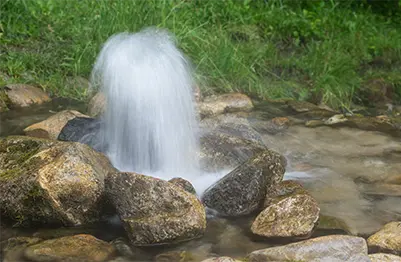

Water Treatment
Effective water treatment is crucial to eliminate impurities, ensuring the water is safe for consumption and suitable for various applications
About
Expert Borehole Water Treatment
Accessing groundwater through boreholes offers a reliable and self-sufficient water supply for both domestic and commercial applications. However, to ensure the safety and quality of this water, appropriate treatment measures are essential.
Igne, with our extensive expertise in ground investigation, geotechnical and materials testing, and specialist drilling, provides an holistic approach to water treatment, ensuring borehole water meets the highest standards.
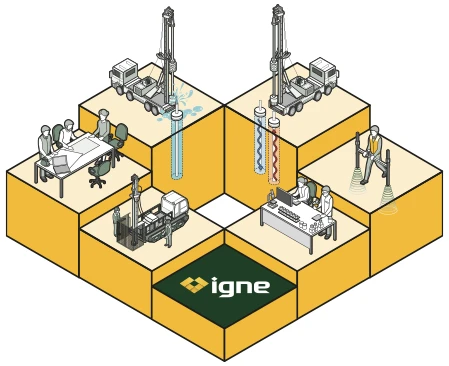
Explainer
The Necessity of Treating Borehole Water
While groundwater is generally of high quality, it can still contain impurities that pose health risks or affect its suitability for specific uses. Potential contaminants include microorganisms, dissolved minerals, and chemical compounds.
Effective water treatment is crucial to eliminate these impurities, ensuring the water is safe for consumption and suitable for various applications.
Igne can ensure that your private water supply is compliant in regard to the Drinking Water Standards.
be informed
Assessing Water Quality: The Foundation of Effective Treatment
A thorough understanding of the water's composition is the first step toward effective treatment. Igne employs a comprehensive testing process that includes:
- Microbiological Analysis: identifying harmful bacteria, viruses, and parasites.
- Chemical Assessment: measuring levels of minerals, metals, and other chemical substances.
- Physical Examination: evaluating properties such as turbidity, colour, and odour.
This detailed analysis enables Igne to tailor treatment solutions that address the specific characteristics of the water source
The perfect solution
Tailored Treatment Solutions for Optimal Water Quality
Based on the assessment results, Igne offers a range of treatment options, including filtration systems which remove suspended particles and sediments to enhance clarity. Disinfection methods which utilise techniques such as chlorination or ultraviolet (UV) treatment to eliminate pathogens. Softening processes that reduce hardness caused by high concentrations of calcium and magnesium.
Other solutions include deionisation and reverse osmosis to eliminate dissolved salts and minerals for applications requiring high-purity water.
Each solution is customised to meet the unique needs of the client, ensuring both safety and efficiency.
Precise Treatment
Addressing Specific Contaminants with Precision
Igne's treatment strategies are designed to manage a wide array of contaminants, including microorganisms. Pathogens such as E. coli and Giardia are effectively neutralised through targeted disinfection.
Chemical pollutants like nitrates, pesticides, and industrial chemicals are removed using advanced filtration and adsorption techniques as well.
Heavy metal elements such as lead, arsenic, and mercury can also be extracted through specialised filtration media and ion exchange processes.
Benefits
The Advantages of Professional Water Treatment
Implementing Igne's water treatment solutions offers benefits such as health protection; ensuring water is free from harmful contaminants safeguards the well-being of consumers of course.
Reducing mineral content can also prevent scale buildup, extending the lifespan of appliances and plumbing systems.
Enhancing the taste, clarity, and odour of water increases its overall quality and user satisfaction too.
Eliminate risk
Potential Risks of Untreated Borehole Water
Neglecting proper treatment can lead to many issues, the main ones being:
- Health Hazards: consumption of contaminated water can result in illnesses and long-term health problems.
- Infrastructure Damage: corrosive elements and scale formation can deteriorate plumbing systems and appliances.
- Operational Challenges: in industrial settings, untreated water can compromise product quality and process efficiency.
Maintain quality
Maintenance: Ensuring Continuous Water Safety
Regular maintenance and inspection of treatment systems are vital to sustain water quality. We recommend scheduled servicing because routine checks and servicing of equipment ensures optimal performance.
Periodic testing to detect any changes in water composition, allowing for prompt corrective actions is also important
Potability
Considerations for Non-Potable Borehole Water Uses
For applications such as irrigation, cleaning, or industrial processes where water is not intended for consumption, treatment requirements may be less stringent.
However, assessing the specific needs of each application is essential to determine the appropriate level of treatment.
FAQ
Frequently Asked Questions about Private Water Supply Treatment
- What are the common contaminants in private borehole water supplies?
Common contaminants include microorganisms (bacteria, viruses), dissolved minerals (iron, manganese), chemicals (pesticides, nitrates), and organic matter.
- How often should I test my private water supply?
It's advisable to conduct a comprehensive water test at least once a year to monitor any changes in quality.
- What treatment methods are available for iron and manganese removal?
Oxidation followed by filtration is commonly used to remove iron and manganese from water supplies.
- Is disinfection necessary if my water looks clear and tastes fine?
Yes, clear and good-tasting water can still harbour harmful microorganisms; disinfection ensures safety.
- Can I install a water treatment system myself?
While some systems are available for DIY installation, professional assessment and installation ensure effectiveness and compliance with regulations.
- How do I know if my water is hard, and what can I do about it?
Signs of hard water include scale buildup and reduced soap lathering; water softeners can address this issue.
- Are there regulations governing private water supplies in the UK?
Yes, the Drinking Water Inspectorate enforces standards and regulations for private water supplies in England and Wales.
- What should I do if my water tests positive for contaminants?
Consult a water treatment professional to identify appropriate remediation measures.
- Can borehole water be used without treatment?
In some cases, borehole water is naturally clean and may not require treatment. However, testing is essential to confirm its quality. Even if the water appears clear, it may still contain contaminants that require treatment. Igne would recommend that a minimum of a sediment filter and UV are installed.
- How much does borehole water treatment cost?
The cost depends on factors such as the type of treatment required, system size, and ongoing maintenance. Igne provides tailored solutions to suit different budgets and needs.
- Does borehole water treatment affect water pressure?
Some treatment systems, particularly filtration and reverse osmosis, may slightly reduce water pressure. However, proper system design ensures minimal disruption.
- How long does a water treatment system last?
With regular maintenance, most systems can last 10 - 20 years, though filters and some components may require more frequent replacement.
- Is treated borehole water better than mains water?
Borehole water that is properly treated can be of equal or even better quality than mains water. It offers greater control over water quality and eliminates reliance on utility providers.
- Do I need planning permission to install a borehole treatment system?
No, in most cases, water treatment systems do not require planning permission. However, if major infrastructure is needed, consulting local authorities is advisable.
- Can a borehole provide enough water for a large business?
Yes, with the right borehole design and treatment system, a borehole can reliably supply water for large-scale commercial and industrial use.
- What’s the difference between UV disinfection and chlorination?
UV disinfection kills microorganisms using ultraviolet light without chemicals, while chlorination introduces chlorine to kill pathogens. The choice depends on water composition and user preferences.
- Can borehole water treatment remove limescale?
Yes, water softening systems remove calcium and magnesium, preventing limescale buildup in pipes and appliances.
- What maintenance does a UV treatment system need?
UV lamps require annual replacement, and the quartz sleeve should be cleaned regularly to ensure efficiency.
- Will a treatment system eliminate all contaminants?
A properly designed system will remove or reduce contaminants to safe levels. Some advanced filtration methods, such as reverse osmosis, can remove nearly all impurities.
- Can I switch off my treatment system when not in use?
Most treatment systems should remain operational to prevent contamination. Some may require flushing or reactivation if left unused for extended periods.
The next step
Ensuring safe, high-quality borehole water requires expert knowledge and the right treatment solutions
Whether you need a new borehole system, an upgrade to your existing setup, or ongoing maintenance, Igne is your trusted partner. We have decades of experience in water well drilling, treatment, and maintenance, working with individuals, businesses, and major organisations across the UK.
Don’t take chances with your water quality.
Contact us today to discuss your water treatment needs and get a tailored solution that guarantees safety, efficiency, and peace of mind.

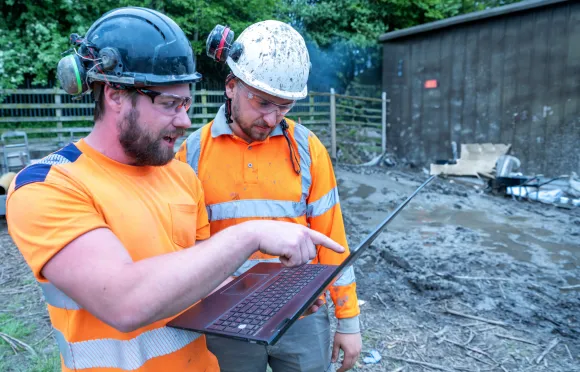
Licencing Applications
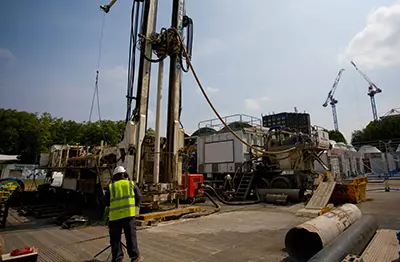
Drilling & Lining
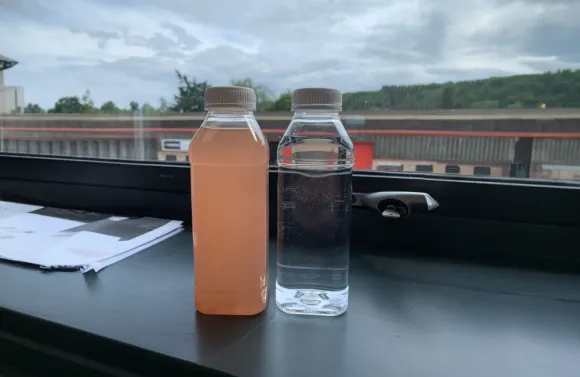
Water Treatment
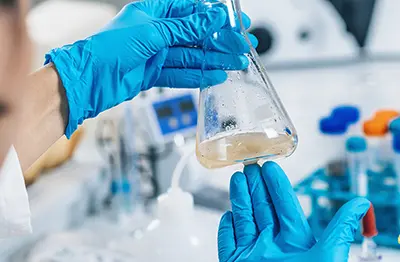
Water Analysis
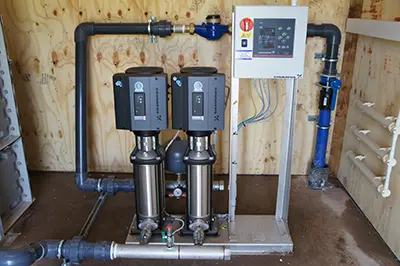
Test Pumping
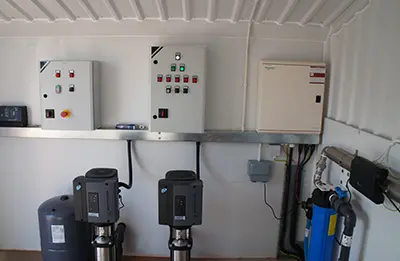
Borehole Pumps

Borehole Design

Abstraction Borehole Real Time Digital Monitoring Systems

Drilling Consultancy

Pump Installation


